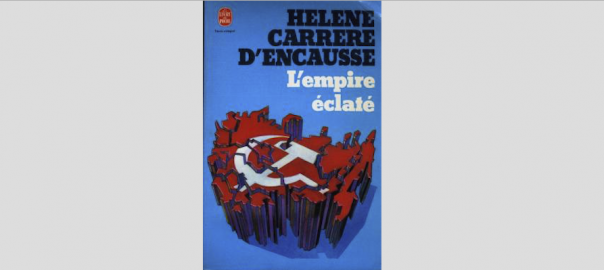26.08.2016 - 08:36
|
Actualització: 26.08.2016 - 10:36
In the early nineteen eighties, I read a book that changed my life. It was L’Empire éclaté, a heart-reaching volume by the historian Hélène Carrère d’Encausse, in which she asked what would happen if the Soviet Union disappeared, very long before it actually happened. For me the book meant a terrible conflict with the Young Communist dogmatism that still formed part of me. It helped me a great deal to rid myself of it, but above all it made me understand that the superficial readings of reality rarely manage to give a view of the movements.
Years after, the Soviet Union broke up, I had the privilege of experiencing it for myself, and also the method of Carrère d’Encausse, who made her prediction when very few saw it (maybe only her and Andreï Amalrik), and for me it produced an enormous intellectual relief. Curiously she was wrong in her view of how things would happen, but not in what would happen. All of the details she accumulated in her study were correct and showed an indisputable reality, which was that what was the second world power was rotten within and was spinning out of control with such intensity that it would effectively necessarily break up.
This summer I read the book again and I was very stricken at the possible parallelism with the present Spanish reality that an interested reading, and I say it that way, could bring forth. Some of the key pieces of the breakup of the Soviet Union can be seen in the present situation in Spain, obviously save all the distances in the world. To make myself understood, it speaks again about the method, which the book taught me is more important still than correctly guessing the anecdote that will unleash the outcome.
Spain is suffering from a galloping, huge, crisis, but as we live inside its bubble, it has made us so accustomed that not even the talk of having further elections at Christmas surprises us. When they come, Spain will have been without a government for a year, amidst a brutal economic crisis only overcome thanks to European patience. The Spanish central bureaucracy, the famous 400 families, have been doing what they want for years, insensitive to the reality of the country. For political reasons, it punishes the strongest economic regions. With suicidal recklessness it ignores the most productive and important markets while it invests enormous amounts of money in projects without effectiveness or reason. The chaos in the infrastructures is absurd and causing irreparable harm, and the operation of its economy is a circus. The main companies of the state all live off politics, off the regulating decrees of the subsidies and prebendaries. Episodes such as Castor show to what extent the Spanish economy has lost its sense of reality, and it is therefore not strange that when its companies try to go abroad, they cast shame upon us. The corruption is a bottomless pit, in fact it has become our whole economic sector. The state is in a cadaverous situation but considers itself to be healthy, even though it loses liquid with each day that passes – it has only two months’ margin to pay the pensions. And it spends irresponsibly to keep up the appearances. And gesticulates. And gives great discourses to sell a non-existent reality that everyone outside can see: Renzi, Hollande and Merkel meet alone to talk about future. Why should they invite this Spain?
But where the parallel reading becomes most interesting is in the political aspects. The Soviet Union was destroyed before it broke up, but Russia was incapable of breaking it. The blow necessarily had to come from the periphery because there was a more and more visible and more and more anguishing characteristic that made it inevitable: the Soviet state had in fact turned into a Russian state. There was one Soviet Union for the Russians and another Soviet Union for the others, and that of the others was much worse, so much so that it was impossible to live there.
So now there is one Spain for the Spanish and another Spain for the others and that of the others is much worse. From the superficial anecdote to what is really important. Superficial: the UEFA makes a map with the timetables of the draw for everyone, it places Barcelona as a reference instead of putting Madrid and Spain leaps like a wolf against the leading body of football to make it change it. How ridiculous! Isn’t Barcelona Spain for the Spanish nationalists? Can’t they see it?
The joke about the UEFA is significant, but on the other side of the spectrum the electoral disablement of Arnaldo Otegi is truly worrying, because it is an arbitrary decision that is a great deal about the time and the place in which we live. It is an indefensible act from a technical and legal point of view and only explicable from the point of view of the use of justice as a political weapon, but against only some! Against some and not others! And this is where it all becomes interesting.
Otegi’s disablement will deprive the Basques of the most basic exercise of democracy, which is to decide who governs them. They already did it to the Basque Country in 2009 when they stopped the left-wing abertzale from taking part in the elections. With this trap they managed to truncate the continuity of the nationalists presidents from 1980 to this day. At that time, the violence of ETA might have made the manoeuvre justifiable in some people’s eyes. But today? The person who has most done for peace has to pay for it by spending six and a half years in a prison condemned in trial while having committed no crime. And it seems that not even this is enough for them now. The most elementary legal logic affirms that an accessory sentence cannot exceed the sentence in itself in time, if the sentence has already been served. But as Carrère d’Encausse explained when talking about the Soviet Union, it is an impossible task to look for logic in a paranoiac system that believes in its own representation of reality.
Isolated therefore from the contrast with reality, the Spanish state launches itself on a repressive crusade and ignores its own legal framework in an action that can only bring peripheral indignation and breakup. Democracy no longer makes any sense when they tell you who you can and cannot vote for or when they use justice to penalise the exercise of the most basic of political rights to block the will of the urns. They try to disable Mas for the 9-N. They try to disable Carme Forcadell for the decisions in Parliament. They try to disable Otegi, and who really knows why?
Only the fanatics cannot see that the Spanish state is immersed in a major crisis, and that it will be caused terrible harm by this practice of breaching the rules of the democratic game by disabling left right and centre; only the fanatics can’t see this. The Principality is paving its way to independence in a few months. In the Basque country, Otegi’s disablement opens the way to a reaction that no one can predict, but which will be considerable. In Galicia En Marea has overcome the tale of Podem and could bring forward a claim unknown since the times of the Republic. The ‘Valencia problem’, non-existent until recently, is now obvious in Madrid. The reactions to the constant provocation, to the legal apartheid, could at any time form a chain…
Because everything is becoming blunter and blunter and this makes one open one’s eyes. Because the criminals Manuel Fraga and Martín Villa were able to run for elections without anyone disabling them. Because Guillem Agulló’s murderer was able to run for elections without anyone disabling him. Because those responsible for the GAL terrorism have been able to run tranquilly for the elections without anyone thinking of disabling them. Because they will not disable the PP when they end up demonstrating that it is a criminal organisation and that it has doped its electoral participations with millions of corrupt euros. Because even Tejero was able to run one year after the coup d’état and while he was still in prison.
Of the answer from the Spanish state you can be sure: it will continue to ignore reality and when it cannot do so any longer, it will try to erase it with repression, with a systematic judicial coup. But I insist: only against some, and this is the key to the parallelism. There were two ‘Soviet Unions’ just like today there are two ‘Spains’. One, far away, made everything break down. The other, here too, could make it all break down as well.


